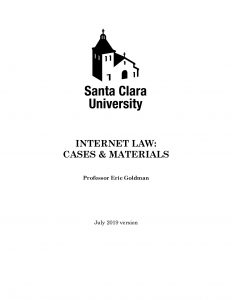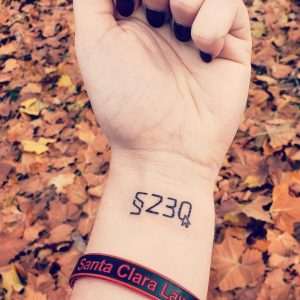Announcing the 2019 Edition of My Internet Law Casebook
 I’m pleased to announce this year’s edition of my Internet Law casebook, Internet Law: Cases & Materials. It’s available as a PDF at Gumroad for $10, as a Kindle book for $9.99, and in hard copy at Amazon for $22 + shipping. [Regarding the hard copy: it comes with a free PDF on request; shipping should be free on Amazon Prime; and this year’s price is $2 less than year!] For my thoughts about self-publishing an ebook casebook, see this article.
I’m pleased to announce this year’s edition of my Internet Law casebook, Internet Law: Cases & Materials. It’s available as a PDF at Gumroad for $10, as a Kindle book for $9.99, and in hard copy at Amazon for $22 + shipping. [Regarding the hard copy: it comes with a free PDF on request; shipping should be free on Amazon Prime; and this year’s price is $2 less than year!] For my thoughts about self-publishing an ebook casebook, see this article.
If you’re an academic and would like a free evaluation copy, please email me. I can also provide my presentation slides and lecture notes for your evaluation. You might also check out my Internet Law course page, which includes 20+ years of syllabi and old exams with sample answers, and my article “Teaching Cyberlaw.”
Last year, I made a lot of changes to the book, including new primers on Section 230, FOSTA, GDPR, and CCPA. I also did major surgery to the online contracts chapter, featuring a swap of Meyer v. Uber for Specht v. Netscape. After the major overhaul last year, this year’s changes are quite modest.
- I finally removed the ACLU v. Reno facts from 1996, a casebook staple since 1997. In its place, I remixed some case excerpts with my own narrative to create a new primer on Internet technology.
- I also did a major revamp 0f the geolocation technology discussion. If you have any comments on either technology primer, I’d welcome your input so I can improve them.
- I removed my 2013 essay on how the DMCA failed. It’s still useful, but I decided it was just redundant enough that I could save the space.
- I updated all of the primers to reflect current developments.
- I added several new discussion notes, such as notes on Section 230 and neutrality, Section 230 and platforms vs. publishers, Section 230 and account terminations, and ALI’s Restatement of Consumer Contracts.
- I made dozens of other edits and updates throughout the book.
Over the years, I’ve posted a fair number of book excerpts that are accessible for free, including:
- The entire chapter on online contracts. It makes a nice module to add an online contracts piece to another course.
- Primer on CCPA
- Primer on FOSTA
- Primer on Section 230
- Excerpt on right to be forgotten
- Excerpt on CFAA/Nosal/Power Ventures
- Excerpt on transborder enforcement
- Excerpt on Brazil’s Marco Civil
- Excerpt on notes about UMG v. Shelter Capital
I have updated all of these materials in the book since I first posted them publicly. Howeverm, only the publicly posted materials on the CCPA and online contracts reflect the current 2019 version.
While the book didn’t change much this year, I made several administrative changes to the course. See my syllabus.
- Last year, I experimented with Prof. Jonathan Zittrain’s case study on Facebook’s contagion experiment as a short writing exercise. Overall I thought it was successful enough to try it again this year.
- I added three new journaling obligations this year. This is my attempt to reflect some insights from the book What the Best College Teachers Do.
- I made the midterm mandatory. It used to be optional. About 2/3 of the students took it last year. When I regressed the final course grades against who took the optional midterm, (not surprisingly) a disproportionate number of the lowest grades went to students who didn’t take the midterm. I felt like those students needed more exam feedback before taking the final.
- I created a new multiple choice “exam” consisting of 31 questions. If you’re interested in seeing the questions, email me.
 This year, I will give automatic Fs to any final exam that doesn’t mention Section 230 or Section 512. I feel like those omissions make me question what course the students took. Yet, despite my best efforts, about 15% of my exams last year met this criteria. I will give ample warning to all students worally and in writing. On the plus side, I will give an A to any student who gets a tattoo of all 26 words of Section 230(c)(1) in a place I can inspect without triggering a sexual harassment complaint (the tattoo on the right, though impressive, didn’t qualify).
This year, I will give automatic Fs to any final exam that doesn’t mention Section 230 or Section 512. I feel like those omissions make me question what course the students took. Yet, despite my best efforts, about 15% of my exams last year met this criteria. I will give ample warning to all students worally and in writing. On the plus side, I will give an A to any student who gets a tattoo of all 26 words of Section 230(c)(1) in a place I can inspect without triggering a sexual harassment complaint (the tattoo on the right, though impressive, didn’t qualify).
As always, I invite your comments and questions.
______
The complete table of contents:
I. What is the Internet? Who Regulates It?
Noah v. AOL (E.D. Va.)
Determining the Geography of Internet-Connected Devices
II. Jurisdiction
Protocol for Evaluating Personal Jurisdiction
Toys ‘R’ Us v. Step Two (3d Cir.)
Illinois v. Hemi Group (7th Cir.)
III. Contracts
Meyer v. Uber (2d Cir.)
Register.com v. Verio (2d Cir.)
Harris v. Blockbuster
IV. Trespass/Computer Fraud & Abuse Act
Review: the Computer Fraud & Abuse Act, 18 U.S.C. §1030 [http://www.law.cornell.edu/uscode/text/18/1030], and California Penal Code §502 [https://leginfo.legislature.ca.gov/faces/codes_displaySection.xhtml?sectionNum=502.&lawCode=PEN]
Comparison of Trespass to Chattels Doctrines
Intel v. Hamidi (Cal. Sup. Ct.)
Register.com v. Verio (Trespass to Chattels section)
Online Trespass to Chattels: a Failed Experiment
V. Copyright
Copyright Basics (Copyright Office Circular 1)
Note About Fair Use
Cartoon Network v. CSC (2d Cir.)
MGM Studios v. Grokster (Sup. Ct.)
Secondary Liability
Review: 17 U.S.C. §512 [http://www.copyright.gov/title17/92chap5.html#512]
Goldman’s Section 512(c) Cheat Sheet
UMG v. Shelter Capital (9th Cir. revised opinion)
Recap
Ticketmaster v. RMG
VI. Trademarks and Domain Names
Review: 15 U.S.C. §1114 [http://www.law.cornell.edu/uscode/text/15/1114], 15 U.S.C. §1125 [http://www.law.cornell.edu/uscode/text/15/1125], and 15 U.S.C. §8131 [http://www.law.cornell.edu/uscode/text/15/8131]
Trademark FAQs
Trademark Glossary
A. Domain Names and Metatags
Review: ICANN Uniform Domain Name Dispute Resolution Policy [https://www.icann.org/resources/pages/policy-2012-02-25-en] and Rules for Uniform Domain Name Dispute Resolution Policy [https://www.icann.org/resources/pages/udrp-rules-2015-03-11-en]
Lamparello v. Falwell (4th Cir.)
Promatek v. Equitrac (7th Cir.) Original Order and Revision
B. Search Engines
Review: Google’s Trademark Policy [https://support.google.com/adwordspolicy/answer/6118]
Network Automation v. Advanced Systems Concepts (9th Cir.)
Tiffany v. eBay (2d Cir.)
VII. Pornography
Pornography Glossary
Reno v. ACLU (Sup. Ct. 1997)
Ashcroft v. ACLU (Sup. Ct. 2004)
VIII. Defamation and Information Torts
47 U.S.C. §230
An Introduction to Section 230
A Note About FOSTA
Zeran v. America Online (4th Cir.)
Fair Housing Council v. Roommates.com (9th Cir. en banc)
International Approaches to Liability for Information Torts
IX. Privacy
Review: 16 C.F.R. Part 312 [http://www.gpo.gov/fdsys/pkg/FR-2013-01-17/pdf/2012-31341.pdf (starting at page 38)]
Excerpts from 16 C.F.R. Part 312, the Children’s Online Privacy Protection Act’s Regulations
The E.U.’s General Data Protection Regulation (GDPR)
An Introduction to the California Consumer Privacy Act (CCPA)
In re. Pharmatrak (1st Cir.)
X. Spam
Review: CAN-SPAM Act of 2003 [http://www.gpo.gov/fdsys/pkg/PLAW-108publ187/pdf/PLAW-108publ187.pdf] and 16 C.F.R. Part 316 [http://www.ecfr.gov/cgi-bin/text-idx?c=ecfr&rgn=div5&view=text&node=16:1.0.1.3.40&idno=16]
Where’s the Beef? Dissecting Spam’s Purported Harms
XI. Blogs and Social Networking Sites
The Third Wave of Internet Exceptionalism
People v. Lopez (Cal. App. Ct.)
Doe v. MySpace (5th Cir.)
Zimmerman v. Weis Markets
Farley v. Callais & Sons
In re Rolando S. (Cal. App. Ct.)
Moreno v. Hanford Sentinel (Cal. App. Ct.)
REVIEW QUESTION ANSWERS
